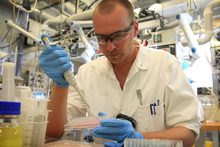Oct 22, 2013

Auckland bio-fuels pioneer Lanzatech has been named the second “hottest” biotechnology company in the world
4th hottest for bio-chemicals at the same time as announcing a new contract with leading Korean petro-chemical company SK Innovation.
The announcements, from respected industry publication Bio-Fuels Digest, come as Lanzatech’s latest filings with the Companies Office show its losses roughly doubled in the year to Dec. 31, 2012, to $36.4 million, compared with a $15.3 million loss in the nine months to Dec. 31, 2011. The company changed its balance date, creating the imbalance in comparisons.
Available share capital at December 2011 of $70.4 million shrank to $43.1 million by the end of the 2012 financial year, accompanied by writedowns in the parent company’s balance sheet totalling $16.3 million and a more fulsome note to the accounts about Lanzatech’s “going concern” status than in previous years.
That note states the company expects to need to raise further capital before March 2014, although Illinois-based chief executive Jennifer Holmgren declined to answer detailed questions on the accounts, as Lanzatech is privately held.
“Lanzatech is subject to due diligence when international investors decide to put money into the company,” she said. “Similarly, when it signs international agreements with global players like SK Innovation, these people look very carefully at Lanzatech’s technology, its company and its potential.”
Lanzatech has numerous scientific and investment alliances with a range of US, Chinese, Indian and Korean institutions and corporations, and with US defence contractors and Richard Branson’s airline on development of a new aviation bio-fuel based on what Bio-Fuels Digest describes as its “magical modified gas-fermenting organism.”
The company raised $73.7 million of new capital in the 2011 financial year. As a start-up spending far more on developing its revolutionary waste gas-to-bio-fuels and chemicals process than it is making in sales, it expects to be loss-making in its development phase and to continue to need to raise capital.
However, plans for an initial public offering, most likely on American and Chinese exchanges, is still some distance away, Holmgren indicated.
The company is committed first to establishing its first commercial units before considering an IPO. These include producing bio-fuels from carbon monoxide expelled as waste in steel-making, including one at a refinery owned by Chinese giant Baosteel.
“We are firmly focused on getting our commercial plants constructed and producing, globally,” Holmgren said. “When that is complete we may be very happy to talk the true value of the company. For something that started in the basement corridor of a Parnell, Auckland, building, it will be truly astounding.”
Lanzatech’s accounts explain the $16.3 million of impairments recorded in the 2012 financial year as reflecting “losses recognised by the Parent against the carrying value of its investment in subsidiaries” because “the stage of development of the group’s business and … development activities do not currently meet the criteria for capitalisation.”
The impairments are taken across the group’s various entities in the US and New Zealand (Lanzatech Inc), and its Hong Kong, China, and Indian operations, with Lanzatech Inc taking most of the impairments, at $13.5 million.
The accounts show income from sales and grants during the year totalled $4.7 million, compared with $2.7 million in the previous nine months, to producing an operating surplus of $1.6 million after cost of sales, against a $2.1 million surplus in the previous period.
To that was added total operating expenses of $32.5 million, up from $16.2 million in the nine months to Dec. 31, 2011, to produce a comprehensive loss for the 2012 financial year of $34.1 million, against $17.6 million in the prior period.
The new tie-up with SK Innovation seeks to exploit the declining availability of a by-product of the oil industry, known as 1, 3 butadiene, used extensively in tires, hoses, belts, seals, carpet backing and medical latex, as well as in moulded plastics for consumer goods, automotive parts and in resins for textiles and engineering.
The shale gas boom in the US is leading to less of the valuable by-product, which is estimated to represent a US$20 billion global annual market.
The development work will be carried out at SK Innovation’s Dae Jon research facility in South Korea, where it will seek to link its proprietary refining techniques with Lanzatech’s gas fermentation process.
– BusinessDesk
